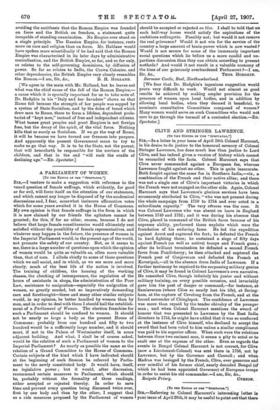A PARLIAMENT OF WOMEN.
[To THE EDITOR 07 THY SPICTAT011.1 Sia,—I venture to make a suggestion with reference to the vexed question of female suffrage, which evidently, for good or for evil, will force itself on the attention of our statesmen, and which cannot any longer be disposed of by the academical discussions and, I fear, somewhat insincere affirmation votes which for some years awaited it in the House of Commons. My own opinion is that female suffrage in the form in which it is now claimed by our friends the agitators cannot be granted; for this, if for no other, reason, because I do not believe that large female constituencies would ultimately rest satisfied without the possibility of female representatives, and whatever may happen in the future, the presence of women in the Imperial Parliament would, in the present age of the world, not promote the safety of our country. But, as it seems to me, there is a large number of questions upon which the opinion of women would be quite as valuable as, often more valuable than, that of men. I allude chiefly to some of those questions which we call social, and in which, as we see more and more clearly, much of the best life of the nation is involved. The training of children, the housing of the Working aasses, the checking of intemperance, the regulation of the hours of assistants in shops, the administration of the Poor Law, assistance to emigration—especially the emigration of women, so greatly needed, but so imperatively demanding care and forethought—these and many other similar subjects would, in my opinion, be better handled by women than by men, and in order to deal with them I should bail the establish- ment of a Parliament of Women. The election franchise for such a Parliament should be confined to women. It should not be nearly so large a body as the present House of Commons : probably from one hundred and fifty to two hundred would, be a sufficiently large number, and it should meet, if not in the Palace of Westminster itself, in some adjacent building. And what, I shall be of course asked, would be the relation of such a Parliament of women to the Imperial Parliament? As nearly as possible the same as the relation of a Grand Committee to the House of Commons. Certain subjects of the kind which I have indicated should at the beginning of each Session be referred by Parlia- ment to the newly constituted body. It would 'have, itself, no legislative power ; but it would, after discussion, recommend certain measures to Parliament, which should be, probably without the formality of three readings, either accepted or rejected thereby. In order to save time and prevent every question being discussed twice over, first by one body and then by .the other, I suggest that as a rule measures proposed by the Parliament of women
should be accepted or rejected en bloc. I shall be told that no such hall-way house would satisfy the aspirations of the ambitious suffragette. Possibly not ; but would it not remove the real grievance ? Would it not win for the service of the country a large amount of brain-power which is now wasted P Would it not secure for some of the immensely important social questions which lie before us a more candid and un- partisan discussion than they can obtain according to present methods? And would it not result in a valuable economy of the time of our grievously overburdened Parliament am,
Sir, Ste., THOS. HODGKIN. Barmoor Castle, Beal, Northumberland.
[We fear that Dr. Hodgkin's ingenious suggestion would prove very difficult to work. Would not almost as good results be achieved by making ampler provision for the presence of women upon local bodies, and in addition by allowing local bodies, when they deemed it beneficial, to nominate consultative Committees composed of women? Many women would serve on such Committees who would not care to go through the turmoil of a contested election.—En. Spectator.]


























































 Previous page
Previous page